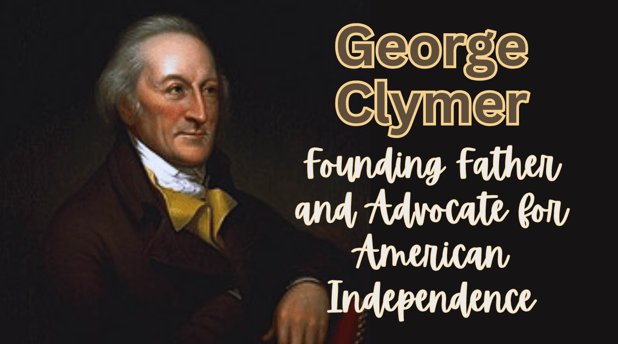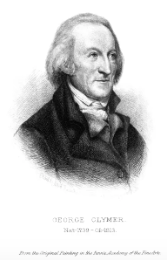George Clymer: Founding Father and Advocate for American Independence
George Clymer (March 16, 1739 – January 23, 1813) was a distinguished American politician, abolitionist, and Founding Father of the United States. He holds the rare honor of being one of only six individuals to sign both the Declaration of Independence and the U.S. Constitution, underscoring his profound influence on the founding of the nation. Known for his early advocacy for independence from Britain, Clymer played a key role in shaping the political and ideological framework of the fledgling United States.
2/11/20253 min read


Early Life and Family
Born in Philadelphia, Pennsylvania, on March 16, 1739, George Clymer’s early life was marked by hardship.
Orphaned at just one-year-old, he was taken in by his maternal aunt, Hannah, and her husband, William Coleman, a prominent merchant.
Under Coleman’s guidance, Clymer was prepared for a career in commerce, learning the business skills that would later support his political endeavors.
On March 22, 1765, Clymer married Elizabeth Meredith, and together they had nine children, though four died in infancy.
Their eldest surviving son, Henry, married the Philadelphia socialite Mary Willing in 1794, while another son, John Meredith, tragically died in the Whiskey Rebellion at just 18 years old.
Clymer's personal life reflected the challenges and complexities of his era, including a previously fathered child mentioned in a letter to Reverend Richard Peters, though the identities of the mother and child remain unknown.
Early Patriotism and Revolutionary Activities
Clymer’s patriotism was evident long before the official call for independence.
He was a prominent figure in Philadelphia’s protests against British-imposed taxes, such as the Stamp Act of 1765 and the Tea Act of 1773, which galvanized colonial resistance.
His leadership extended to military readiness as he commanded a volunteer corps within General John Cadwalader’s brigade.
In 1759, Clymer joined the American Philosophical Society, reflecting his deep intellectual and political interests.
His role in the Philadelphia Committee of Safety in 1773 further cemented his reputation as a trusted leader during the Revolutionary War.
By 1776, Clymer was elected to the Continental Congress, where he contributed significantly to the revolutionary cause.
Service During the Revolutionary War
Clymer’s tenure in the Continental Congress (1776–1780) was marked by pivotal responsibilities, including sharing the position of Treasurer of the Continental Congress with America's first treasurer Michael Hillegas.
As a member of several committees, he was instrumental in shaping military and financial policies during the war.
In the fall of 1776, Congress entrusted Clymer and Sampson Mathews to inspect the northern army at Fort Ticonderoga, reflecting their confidence in his leadership.
When Philadelphia faced occupation by British forces under Sir Henry Clinton, Clymer stayed behind with George Walton and Robert Morris to protect congressional interests.
His steadfast commitment during these turbulent times underscored his unwavering dedication to the Patriot cause.
Economic Ventures and Post-War Contributions
Clymer’s business acumen played a key role during and after the Revolution.
While he had little personal interest in commerce, he partnered with his father-in-law and brother-in-law in lucrative trading ventures, including trade with Sint Eustatius in the Caribbean during the war years.
These ventures significantly increased his wealth and allowed him to contribute materially to the war effort.
After the war, Clymer returned to public service, focusing on strengthening the nation’s financial and governmental structures.
He was a delegate to the 1787 Constitutional Convention, where his contributions helped shape the U.S. Constitution.
As a Framer, Clymer advocated for strong federal governance while also attempting, though unsuccessfully, to regulate the importation of enslaved people.
Legacy as a Founding Father
George Clymer’s legacy is multifaceted.
As one of the few Founding Fathers to sign both the Declaration of Independence and the Constitution, he was deeply involved in shaping the foundational documents of the United States.
His contributions to the Revolution, from military support to financial management, were critical to American victory and the establishment of a stable government.
However, Clymer’s legacy also reflects the complexities and contradictions of the revolutionary era.
Despite advocating for liberty and independence, he benefited from the institution of slavery through inheritance, even as he later supported efforts to end the slave trade.
His commitment to public service and his efforts to reconcile his principles with the realities of his time highlight the enduring tensions in the early history of the United States.
Conclusion
George Clymer’s life and career exemplify the challenges and triumphs of America’s Founding Fathers.
From his early advocacy for independence to his role in drafting and supporting the Constitution, Clymer played a significant part in the creation of the United States.
His contributions to the Revolution, both as a statesman and a businessman, underscore his dedication to the cause of liberty.
Yet, his personal contradictions remind us that even the most influential figures of history were shaped by the complexities of their time.
George Clymer



